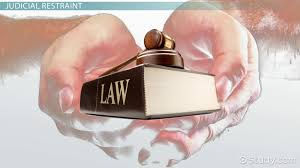
The judges now-a-days serve as puppets of the party in power. The impartial ruling of the cases is at stake and can gravely damage justice. If the courts of our nation are all caught up in routine political disputes and are perceived as just another political actor in an attempt to advance its interests and preferences, then the court's legitimacy will suffer sternly.
The primary goal of any court system (be it the Supreme Court or a lower court) is to maintain domestic tranquillity and render fair verdicts. The Court has earned the title of "one of the world's most powerful judicial bodies," with its judges "playing an unprecedented governing role."(1) Judicial legitimacy comes from the idea that judges are fair and their decisions are based on the law, but court rulings lean in favour of the political camp.
Post-2014, there has been a significant shift in the power dynamics of courts. Pre-2014 period, the scenario was different. The Supreme Court was not afraid to go up against the Central Executive in cases with high political stakes. The then powerful court who went against the political arena is evident in the cases of 2G licence cancellation and coal scams.
Although the verdict in the coal-gate case was delivered in September 2014 after the arrival of the NDA government, the hearing took place in the last leg of UPA-II, during which the court made several oral remarks (including the now famous "CBI is a caged parrot" remark), which severely harmed the government. This intervention by the court was applauded by the media and the general public. The Court fought against corruption.
However, after 2014, the SC took on a new look. There has been a trend where it seems that courts are in favour of party in power. When it came to cases that could sting the ruling party's political interests, the SC was seen as a weaker version of itself by the public.
BHIMA KOREGAON CASE
It was in the Bhima Koregaon case that prominent citizens Romila Thapar and four other people demanded for an SIT investigation into Unlawful Activities (Prevention) Act charges against five activists, Sudha Bhardwaj, Gautam Navlakha, Vernon Gonsalves, Varavara Rao and Arun Ferreira, on the grounds that police investigation was biased. Justice Chandrachud dissented, and the case was dismissed by a 2:1.
RAFALE CASE
The court's approach was criticised in the Rafale case as well. Instead of declining an order to investigate allegations of corruption surrounding the deal because of the limited scope of judicial review applicable to defence contracts, the court accepted the government's pricing version and concluded that the government had not interfered in selecting Reliance as an offset partner. There was no need to review the merits of the deal which gave rise to doubt of corruption; instead the court accepted the denial of one of the disputing parties as fact and appeared to be conclusive in its decision. The then Chief Justice Gogoi said he couldn't get involved in defence contracts or procurement because of national security concerns. The apex court ruled that it was not the role of the court to deal with the comparative details of pricing. Later Justice Ranjan Gogoi was nominated as a member of parliament.
There are many other cases where people have criticised the Supreme Court's handling of politically charged cases like Sahara-Birla, Loya, and Aadhaar because of the Court's apparent reticence to take on the system.
JUDICIARY LEFT ENFEEBLED
The present regime seems to be in a continuous state of conflict with the judiciary on a number of issues. The judiciary has been battered and weakened as a result of its five-year collision course with the political wing. Complementing it were issues that came out of the court, making it appear divided and causing it to lose the moral authority it had once enjoyed in the eyes of the public (medical college bribery case, master of roster problem, impeachment motion against former CJI Dipak Misra).
The Supreme Court has taken a progressive stance, broadening the Constitution's transformative vision. This was evident in the privacy case, the Sabarimala case, and judgments that struck down Section 66A of the Information Technology Act, as well as Sections 377 and 497 of the Indian Penal Codes. But these instances give faint hopes amid thick fog generated by scepticism about the judiciary's independence.
CONCLUSION
It is growing perception in general public that the courts in the present regime are apprehensive to go against the government.
Most of the simple arguments have been turning into a political debacle. Instead of delivering justice, the judicial system has been fuelling the agenda of political parties by putting up a charade which in turn is jeopardizing the citizens of our country. However, the Supreme Court and high courts must no longer be terrified by the enormous power of the legislature and the executive, for the betterment of the country.
References-
1- https://thewire.in/law/supreme-court-modi-years
